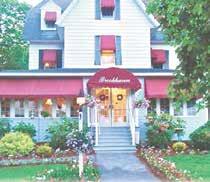




Frederick W. Clark Jr. of Bridgewater State University

People today can spend nearly half their lives over the age of 50. That’s a lot of living. So, it helps to have a wise friend and fierce defender like AARP in your corner and in your community so your money, health and happiness live as long as you do.
AARP offers custom tools, resources and local expertise to help you achieve your goals and stay connected. Find us at aarp.org/ma


By Jennifer Benson AArP MAssAchusetts stAte Director
Criminals have found a new way to steal your money. Like everything else, they’ve gone high tech. They’re using crypto ATMs to get your money.
Fraud criminals steal billions of dollars from unsuspecting consumers every year. The impact on victims and their families can be financially and emotionally devastating, especially for older adults. Knowledge gives you power over scams. The AARP Fraud Watch Network equips you with reliable, up-to-date insights, and connects you to our free fraud helpline so you can better protect yourself and loved ones.
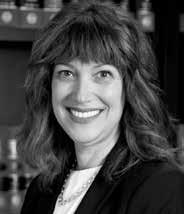
Cryptocurrency kiosks, often seen in supermarkets, convenience stores, gas stations, and even laundromats, have become a common sight across the country. These machines convert real dollars into crypto dollars. They’ve grown in number from about 1,200 at the end of 2017 to over 45,000 today. While they offer a legitimate service, they have also become a favorite tool for scammers, leading to significant financial losses, especially among older adults.
The rise in cryptocurrency ATM fraud is alarming. According to the Federal Bureau of Investigation (FBI), these schemes have increased, with many victims being older adults. In the first half of 2024 alone, the Federal Trade Commission (FTC) received reports of fraud losses through Bitcoin ATMs totaling $65 million, with $46 million reported by victims aged 60 and older. The actual amount stolen is likely much higher, as fraud is notoriously underreported. The FBI received 5,500 complaints in 2023, reporting $189 million in losses.
Scammers often use these unregulated ATMs in various schemes; everything from romance scams to grandparent scams. They trick victims into depositing cash, stealing hundreds of millions annually.
In Massachusetts, AARP is backing legislation that aims to strengthen consumer protections in the state, which already boasts some of the strongest consumer protection laws in the country. The proposed measures include licensing cryptocurrency ATM operators, imposing daily transaction limits, posting visible fraud warning notices, creating a special commission to study blockchain technology, and ensuring residents have access to educational materials to manage their finances and safeguard their financial well-being.
AARP successfully fought to introduce and pass similar protections in Vermont. Vermont now requires cryptocurrency kiosk operators to register with the state and has a daily transaction limit of $1,000, among other measures.
AARP has a long history of fighting fraud that targets older Americans and of equipping consumers with information and resources to better protect themselves. The AARP Fraud Watch Network can help people learn to spot and avoid scams. AARP Massachusetts holds Fraud Talk Tuesdays once a month where we break down the latest scams and how to protect yourself. You can find more information at aarp.org/mafraud. If you have become a victim of a scam, you’re not alone. There’s help at the AARP Fraud Watch Network Helpline: 877-908-3360. Our toll-free service is available Monday through Friday, 8 a.m. to 8 p.m. Our fraud specialists provide free support and guidance on what to do next.
Jennifer Benson is the State Director for AARP Massachusetts. For more articles visit www.fiftyplusadvocate.com.
By shAron oliver contriButing Writer
BOSTON – Boston born and disgraced FBI agent John Joseph Connolly Jr. crossed the line in his relationship with the late mob boss James “Whitey” Bulger.
Childhood connection
Connolly grew up in the Old Harbor Housing Project in South Boston just a few doors down from the Bulger family and was a childhood friend of Billy, the future state politician and younger brother of notorious mob boss Whitey. Reportedly, a 19-yearold Whitey Bulger, who was already head of the Mercer Street Gang, once chased away bullies looking for a fight with a then-8-year-old Connolly over a ball.
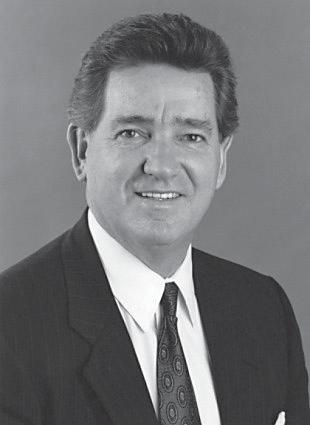
ly agreed to provide protection for Bulger against prosecution for his illegal activities. This partnership lasted 15 years and allowed Bulger to build a criminal empire which included drugs. It also bolstered Connolly’s career by enabling him to take down crime figures like Gennaro Angiulo, the head of Boston’s Italian Mafia, and the Patriarca crime family of Rhode Island. Thanks to Connolly, prosecutors alleged, Bulger got away with many crimes.
Indicted after retirement
to serve a 40-year sentence. Callahan allegedly had information that could have implicated Bulger in a murder.
Medical release parole
Connolly asked for permission to serve the remainder of his sentence on home confinement due to fears of contracting COVID-19 in 2020, citing a 2018 federal law allowing for compassionate release under “extraordinary” circumstances, such as age, health and other critical factors. Although a Miami-Dade judge initially declined the request, Connolly was eventually granted a medical release in 2021 with the belief that Connolly was terminally ill with cancer and did not have long to live.
The future FBI agent and his family moved away from the neighborhood when he was 12 years old and while Bulger rose up in the ranks in Boston’s criminal underworld with the Winter Hill Gang, Connolly attended Boston College and began his FBI career in the Baltimore and San Francisco field offices before being transferred to Boston in 1973. Two years later, he would form an illicit alliance with his old neighbor and cross a line that would land him behind bars.
Connolly retired in 1990, but his nefarious deeds came to light in 1998 after it was learned that he tipped off Bulger and his partner Stephen Flemmi, telling them to flee. The former agent was indicted in 1999 on charges of falsifying FBI reports to cover the crimes of Bulger and Flemmi, accepting bribes, racketeering, obstruction of justice and lying to an FBI agent. He was convicted in 2002 and sentenced to 10 years in prison.
In 1975, Connolly convinced Bulger to become an informant. In exchange for receiving information on rival gang members, Connol-
Having leaked information which prompted Bulger to take a hit out on a man named John Callahan, Connolly was convicted on state charges of second-degree murder in 2008 and was transferred to a Florida prison in 2011
In 2023, a Florida parole board ruled in favor of the 84-year-old Connolly continuing his convalescence in his Massachusetts home with his wife Elizabeth. The interstate compact specifies a “termination of supervision” scheduled for December 2047. However, Connolly has outlived the initial life expectancy, and the parole board may revisit the situation.
Connolly was one of the primary agents involved in developing the Top Echelon Criminal Informants Program

By nAnce eBert contriButing Writer
BRIDGEWATER – Frederick W. Clark
Jr., the president of Bridgewater State University, has a stronger than usual bond to the university he leads, one that has endured virtually all of his adult life. He is a member of the class of 1983, as are three key members of his staff. And he met his wife, Carrie, a member of the class of 1985, there as well.
Clark is extremely passionate about his role and the many hats he wears, while acknowledging his humble beginnings as a student there five decades earlier.
One of six children in a Brockton family, he feels attending Bridgewater State College (known as a college and not a university at that time) was the gateway to opportunity. He wanted to be a lawyer in government and politics and studied political science.
Opening doors
Bridgewater State was founded in 1840 by Horace Mann. Clark is the 12th president to lead the university in its
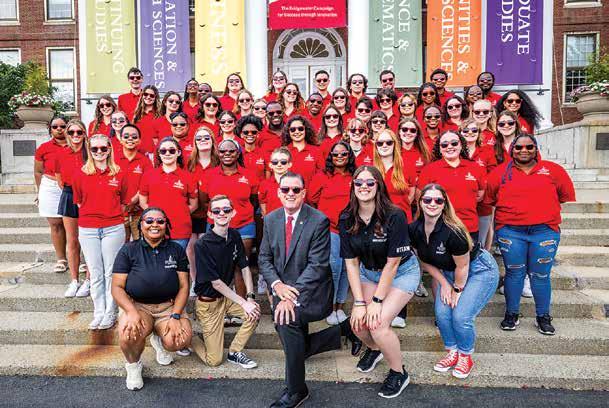
mission to open doors of opportunity for students that he feels he and his staff are privileged to serve.
“We relentlessly focus on the suc-
cess of our students, and we continue to invest in personalized, innovative retention services that have not gone unnoticed,” Clark explained. “The
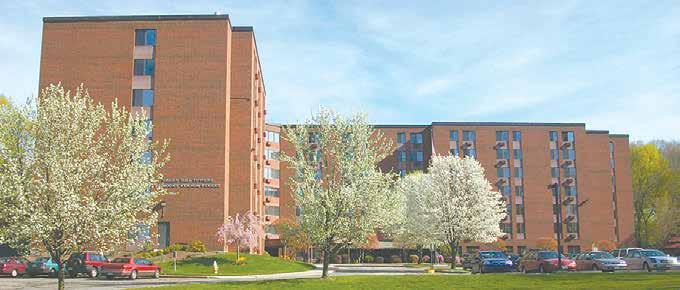
Within the building amenities include:
• A Theater-like media center
• Handicap-accessible lounges on every floor
• Library equipped with two computers and free internet access
• Physical fitness center
• Game room with billiard table
• Community room with bingo board and large screen TV
27 Mount Vernon Street, Worcester, MA • O ffice O pen D aily 8:00 am - 4:30 pm
To receive an application please call 508-755-6062 TDD# 508-755-0228
Now accepting applications for 62 years of age and older and those who are under 62 years of age and are permanently disabled.
Applicants must meet HUD annual low income guidelines. Preference is given to individuals 62 and older.
Frederick W. Clark Jr., the president of Bridgewater State University, pictured here with BSU’s orientation leaders, says that beginning in the fall 2025 semester the university will cover the full cost of tuition and mandatory fees for in-state students from families earning $125,000 or less.
Wall Street Journal ranked BSU in the top seven percent of all U.S. universities for advancing the social mobility of students, and in Massachusetts, we
• Contemporary styled 1 & 2 bedroom apartments
• New kitchens with built-in microwaves and granite-like countertops
• Small pets welcome
• Heat and Hot water included
• Bus route / ample parking
• Beautiful landscaped grounds with gazebo





Frederick W. Clark Jr., the president of Bridgewater State University, shown here at the university’s annual welcome barbecue, admits that his favorite part of his job is interacting with the student body.
are fourth out of 100-plus universities for advancing the social mobility of our graduates,” he noted.
After graduating from BSU in 1983 with a Bachelor of Arts in Political Science, Clark went on to Suffolk Law School and received his Juris Doctor degree in 1986. He held many positions serving Bridgewater State prior to his presidency. Some of these roles included being a member and executive member of the Board of Trustees, vice chairman of the Bridgewater State Foundation and executive vice president and vice president of external affairs. He worked for over eighteen years for Congressman John Joseph Moakley as district director, legal counsel and Washington liaison officer. He also currently serves on several boards and committees.
A strong team
Clark said he has an incredible team, including cabinet members along with college deans. And the class of 1983 is well-represented on his staff. One former BSU classmate, Paul Jean, is the vice president for enrollment, marketing and communications. Jean was previously employed at a public relations firm in Boston and was “guilted “into coming to BSU to help tell the university’s story, Clark joked. Emmy award-winning television reporter David Robichaud, also a BSU ’83 graduate, is currently BSU’s assistant vice president for content strategy and development. Peg Campbell, another BSU class of ’83 member, is director of major gifts and planned giving.
“David is responsible for producing many of our videos and leads our social media in-house team,” Clark said. “We objectively have one of the best social media presences out there today and he expertly uses photos, video and print to tell the Bridgewater story.”
Another unique feature of BSU that Clark said he is proud of is its Senior
College at Bridgewater State University. This program offers those age 50 and beyond to participate in both virtual and in-person classes while exploring new subjects, passions, knowledge and skills while engaging socially and making connections. It allows participants to enroll in as many courses as they like throughout the semester with a fee of just $95. These classes take place online, at the main campus, as well as at off-campus sites in Plymouth, Easton and Bridgewater.
“We have five hundred seniors currently participating and there are no grades. This is such a terrific resource, and we have gotten wonderful feedback from participants,” said Clark.
Connecting with the community
Clark said he is always looking for ways to connect with his students and truly enjoys getting out of his office. He explained that the best part of his job is interacting with the student body, and he does not hesitate to ride around in a golf cart talking to students and, perhaps even giving out free t-shirts, gloves, and other items.
“I am always looking for ways to help and serve this institution better,” Clark stated. “I cannot stress the importance of higher education. It helps build leadership skills and better citizens. People need an affordable option and that, too, is our mission. In the fall 2025 semester,” Clark noted, “the ‘Bridgewater Commitment’ will cover the full cost of tuition and mandatory fees for in-state students from families earning $125,000 or less.”
And the family tradition of attending Bridgewater State University has continued for the next generation of the Clark family. All three of Clark’s children have attended the university where their parents met as students. His two sons, Justin and Derek, have already graduated and his daughter, Reilly, is a senior.
For more information about Bridgewater State University visit https://www.bridgew.edu.

Whether you lean right, left, or down the middle — change brings uncertainty. I’m hearing:
• Social Security and VA benefits might be interrupted
• Retirement accounts plummeting
• Tariffs increasing
• Egg prices skyrocketing
• Higher real estate taxes & insurance costs
• More expensive doctors, prescriptions, and at home care
• Credit card balances growing
• Children & family financial needs increasing
• Being forced to sell your home
• And, of course, the unknown financial surprises that we all face.
A reverse mortgage may be your solution to reducing financial stress and being able to afford your home. A reverse mortgage is a government guaranteed loan that allows qualified 62-years or older homeowners to receive tax-free cash when needed or desired.
• No monthly mortgage payments are required
• Note – you are responsible to pay your homeowners insurance, real estate taxes, and meet loan guidelines.
• Eliminate your current mortgage or equity line payment
• Receive a lump sum amount of cash, a monthly check, and/or a line of credit that grows as you get older
• Easier income qualification than conventional loans
• No minimum credit score required
• May be used to pay off current mortgage and other debts
• You continue to own and control your home
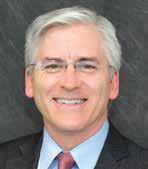
Alain Valles
Reverse Mortgage Specialist 781-724-6221
A great place to start is get your free “How to Use Your Home to Stay at Home” 36-page book. This is the official reverse mortgage consumer booklet approved by the U.S. Department of Housing & Urban Development and published by the National Council on Aging.
To receive your free copy, please call or text me at (781) 724-6221 or email me at av@powhse.com
I am also available to evaluate your specific situation, answer your questions, and calculate how much money is available to you.
Alain Valles was the first designated Certified Reverse Mortgage Professional in New England. He obtained a Master of Science from the M.I.T. Center for Real Estate, an MBA from the Wharton School, and graduated summa cum laude from UMass Amherst. He is the senior reverse mortgage loan officer MLO#7946 at Powerhouse Funding Corp. NMLS #1740551. He can arrange but does not make loans. Alain can be reached directly at (781) 724-6221 or by email at av@powhse.com
By evAn WAlsh contriButing Writer
WESTBOROUGH – Nelson Ball has been called the “father of pickleball” in Westborough. And it all started with one fateful “pop.”
While playing tennis in Venice, Florida, Ball heard an unusual noise from across the gym. The sound was a mere distraction — or maybe it was fate — but he followed this unfamiliar “popping” sound across the building, where he discovered two gentlemen playing pickleball, a then up-andcoming sport that involves two (or more) paddles and a perforated ball.
Longtime tennis player
Ball was a longtime tennis player, but his athletic group “imploded” as people reached their 80s and were no longer quite agile enough to hustle around the court. Pickleball didn’t have the popularity it enjoys today when Ball stumbled upon it several years ago. But, in that moment, he realized just how big it could become —
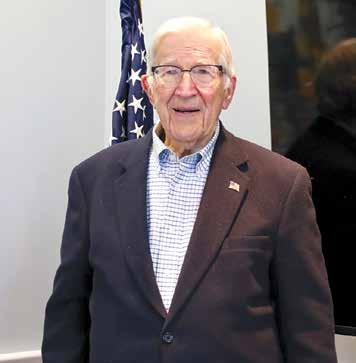
especially for seniors.
“I thought, ‘Man, I’m going to have to learn that game,’” Ball told the Fifty Plus Advocate.
An early adopter of the sport, Ball
Nelson Ball, a 93-year-old Westborough resident, stays active by working part-time, playing trombone in a local band, and playing pickleball. (Photo/Evan Walsh)
painter’s tape to mark off the “kitchen” and weigh down tennis nets with 10-pound weights. Nothing would stop this group from a good pickleball session.
As the sport grew, more courts were restriped or constructed, including four in Westborough. But Ball still felt like there was more capacity for pickleball in his hometown. So, in 2020, he footed the bill to construct four more public courts along Lake Chauncy. The courts are officially known as the Nelson Ball Pickleball Courts, and Ball lives within walking distance.
Now 93 years old, Ball works three days a week. The other days? He’s out on the court.
and his pickleball posse started as roving athletes, tracking down areas across Central Mass. to break out the paddles. With a lack of dedicated pickleball courts, his group would bring
Now accepting Applications for 62 years of age and older and those that are under 62 years of age and are permanently disabled.
• Heat and hot water included
• Qualified Applicants pay 30% of adjusted income
• 24 hour emergency maintenance
• Non-Smoking Community
• Monthly activities include: exercise classes, birthday parties, book mobile, blood pressure screens and podiatry
• Manicured walking paths with garden plots
• Ideally located in Natick residential bus route • Pets okay under 20 lbs.
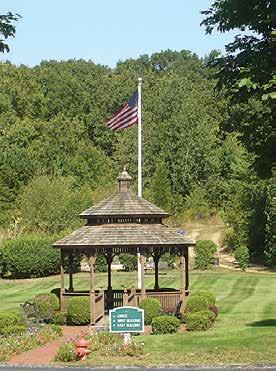

“When I drive by, it’s so great just to see all those people using the courts. I did it because I thought there really wasn’t anything for adults — and we had to do something for the seniors,” said Ball. “It’s a great mixer. It’s not so much the physical element, it’s the sociability for seniors. That’s so important. They meet new people


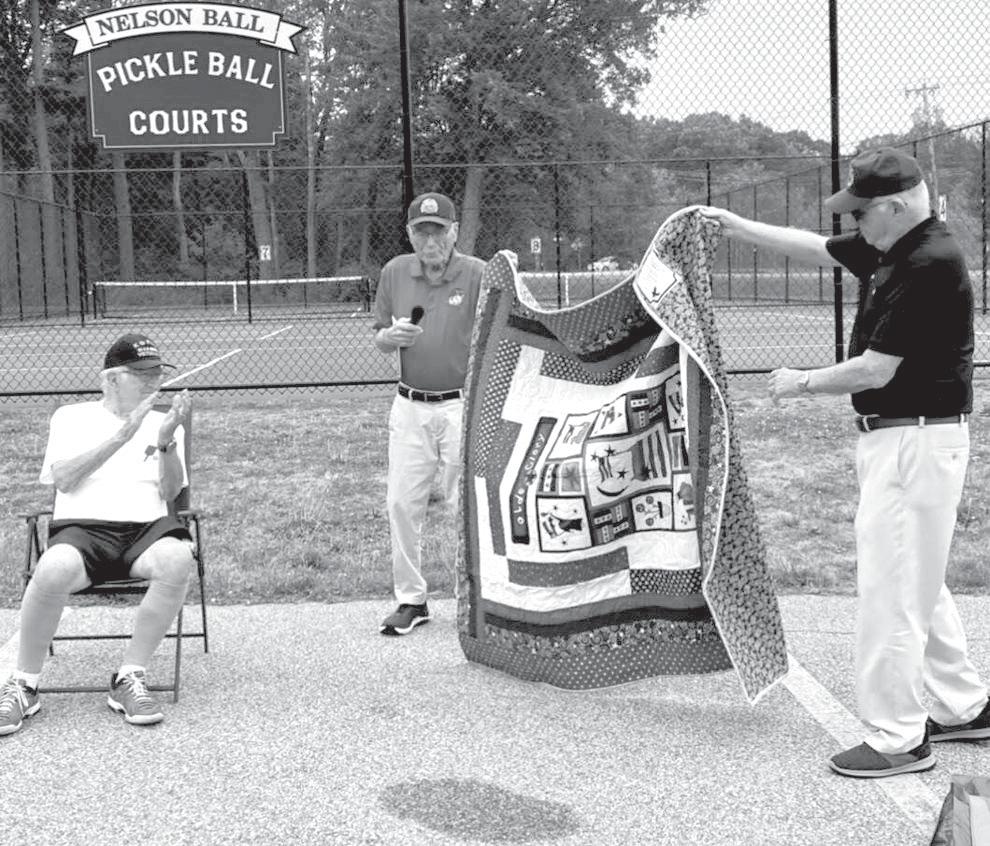
and
people tell me I saved their life.”
An amazing life
But anyone who knows Ball understands that his dedication to pickleball is just one small part of his amazing life. Through decades of volunteer and philanthropic efforts, Ball has worked tirelessly to improve Westborough in just about every area. Sure as the sound of the pickleball hitting the paddle, he’s lived a life that truly “pops” off the page.
Ball was born in Orange, New Jersey, a township just outside of Newark. Growing up in the end of the Great Depression, life wasn’t always easy for Ball. He didn’t have a car, so to get to his classes at Upsala College, he took a train and walked several miles to campus; his father worked on the railroads
to defray some of the cost. Ball held down four jobs and worked as a milkman to afford his $400 annual tuition.
The drum major of Upsala’s band, he eventually married Sylvia, the drum majorette.
After college, Ball enlisted in the U.S. Army and was deployed to Korea from 1954 to 1957, just after the fighting subsided. As part of his role as a counterintelligence agent, Ball spent over 1,400 hours in class learning Korean — and he still speaks the language today. During his time in Korea, he visited an orphanage and dressed up as Santa for the children.
“Except for being away from my two-month-old daughter and wife, I had a good tour,” Ball remembered.
“One of the best things I did was I taught English to seven college women while I was there. I never realized
how difficult English was to learn. They wouldn’t understand me at first, but by the time I left, they got all the puns and the jokes.”
After his time in Korea, Ball landed a job in Westborough, a “great town” where he has spent the majority of his life since. In 1965, he started Ball Financial Services. From humble beginnings, the organization has grown to become one of Central Mass.’s preeminent financial companies. Two of Ball’s children manage the company today, which has remained headquartered in town.
“I didn’t have an office. I ran the business out of my basement for five years — with five kids. Everybody thought I was crazy, and they were probably right, but it worked out very well,” said Ball.
Beyond business — and pickleball — Ball has continued to give back to the community. In 1969, he became the charter president of the Westborough Rotary Club, which celebrated its 50th anniversary in 2019. He served as the scholarship chairman for a quarter-century, giving
“Remain in Me, and I Will Remain in You.”
over $1 million in aid over the years to Westborough students. He’s still an active member.
There are the other awards and accomplishments, but Ball spends a great deal of time on his other main passion: music. A member of the Interboro Community Band, he plays the trombone. Ball was also the first president of the Westborough Music Parents Association. Without music, he says, the world would “be flat.”
At 93, Ball has no plans to stop running his business, playing the trombone, and, yes, playing pickleball. His uncle and grandfather both worked until they were 95, he said, with the latter living until 103. So, that’s the goal, Ball said laughing.
With all this success — business-wise, music-wise, family-wise, and more — how does Ball explain how he achieved such an admirable life? A devout member of Westborough’s First United Methodist Church, he answered the question promptly — his faith.
“Trust in God. He’s been so good to us. We’re so thankful for everything.”

The life that Christ promises is much more than an emotional experience, it creates inner peace, a constructive purpose in life, and provides the strength to achieve and maintain such a life through the power of the Holy Spirit.
-

By shAron oliver contriButing Writer
BOSTON – In 1957, rock duo the Everly Brothers found themselves under the city’s censorship due to what was considered suggestive lyrics in their hit single “Wake Up Little Susie.” “Banned in Boston” is a term coined and used from the late 19th century through the mid-20th century, to describe literary works, songs, movies or plays which had been prohibited from distribution or exhibition in Boston. The seemingly wholesome teen idol brothers from Tennessee’s song made the infamous list of things that Boston had found unacceptable.
Those lyrics about a young high school couple on a date at the movies falling asleep past the girl’s curfew would be viewed as tame in today’s society.
Catholic Church disapproval
However, the Boston Archdiocese did not see it that way. Carrying lots of influence at the time, it ordered all local radio stations to remove the con-
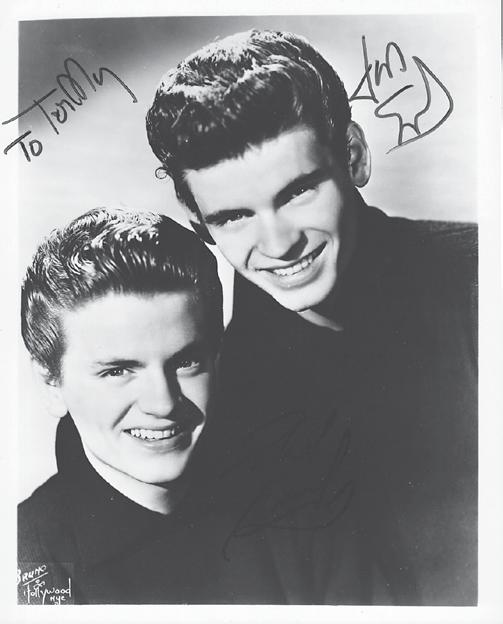
troversial song from the airwaves. The problem with telling anyone not to do something often only increases curi-
The supposedly suggestive lyrics of the Everly Brothers’ hit single “Wake Up Little Susie” got the song banned in Boston in 1957 due to pressure from the Catholic Church.
(Photo/Wikimedia Commons)
ing, ‘Here’s a song that was banned in this city in 1957.’ Then, we sang it, and it just sounded like a harmless little ditty. How far we’ve come.”
He thought it was a “harmless little ditty” in 1957, too. “I remember when it happened. They called and said it had been banned in Boston. I said, ‘What?’ It’s what people read into it, isn’t it? Today, you say that innocent little song was banned in Boston, and somebody’s going to ask you, ‘Where were people’s heads?’ Phil and I sang pretty much innocent stuff. Our songs were about relationships. Looking back over the lyric content of our music, I’m basically very proud of it. There’s nothing to be ashamed of. There’s nothing sleazy or off-color in there.”
Other Boston bans
2
❖
❖
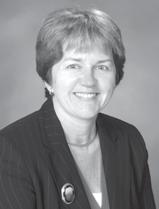
Josephine L. Veglia, Esq.
osity and Boston’s banning certainly did not stop the hit record from reaching number one on the Billboard Pop Chart, the Cash Box Best Selling Records chart or spending seven weeks on the Billboard country chart. The hit song was ranked at No. 318 on the Rolling Stone magazine’s list of “The 500 Greatest Songs of All Time. In 2017, the Everly Brother’s 1957 recording, which was their second number one hit after “Bye Bye Love,” was inducted into the Grammy Hall of Fame.
Culture attitudes shifted significantly between the 1950s and 1980s and the Everly Brothers performed “Wake Up Little Susie” at the Boston Common in 1986. It was the perfect opportunity for the brothers to respond to their previous banishment.
Don Everly recalled the moment in an interview with the Chicago Tribune that same year. “I introduced it by say-
To be banned in Boston came with a certain notoriety and attention. The ban extended to the $5 bill from the 1896 “Educational” series of banknotes featuring allegorical figures that were partially nude. Baltimore journalist H. L. Mencken was arrested in Boston in 1926, after purposely selling a banned issue of his magazine The American Mercury. The novel “Strange Fruit,” Lillian Smith’s tale of forbidden interracial romance, was also banned by the Watch and Ward Society (Boston’s vice watchdog organization). In 1961, singer and talk show host Merve Griffin even recorded a novelty song, “Banned in Boston,” which became a modest hit. Born in Knoxville, Tennessee, the Everly Brothers experienced continued worldwide success throughout the years and eventually sought solo careers due to tensions between the siblings. The brothers reunited for a concert at the Royal Albert Hall in London in 1983. Phil Everly died in 2014 at age 74 and Don Everly passed away in 2021 at age 84.




By shAron oliver contriButing Writer
REGION – Everyone has a hometown, including characters on television series. Over the years, script writers have sometimes favored the state of Massachusetts for some sort of representation. In one episode of “The Andy Griffith Show,” even Mrs. Wiley mistakenly thought mountain man Ernest T. Bass was from the Back Bay in Boston.
Early legal drama
Before there was “Boston Legal,” or “Ally McBeal,” where fictional characters lived and thrived in Boston, there was another legal drama based in the city called “The Young Lawyers.” The series ran from 1970 to 1971 on ABC and starred Zalman King, Phillip Clark and Judy Pace as law school students who help poor and indigent clients needing assistance at “Neighborhood Law Office.” The legal aid center was helmed by veteran actor Lee J. Cobb who played David Barett. The television pilot first premiered as a movie in 1969, featuring comic legend Richard Pryor.
There were other television series from the 1970s whose characters had roots in the Bay State. Perhaps the most surprising of all may be Carol Brady, the pixie blonde matriarch of “The Brady Bunch,” portrayed by Florence Henderson.
From The Brady Bunch to M*A*S*H
In an episode titled “A Fistful of Reasons,” youngest daughter Cindy is bullied because of her lisp. The stay-at-home mom confesses to her husband Mike that she too overcame a lisp while growing up in Swampscott. Aside from growing up in the North Shore, not much else is known
FBI agent John Connolly crossed the line with mob boss
John Connolly | from page 3 in New England and received eight commendations from every director of the FBI up until his retirement, starting with J. Edgar Hoover. U.S. Attorney Michael Sullivan once told The New York Times, “John Connolly became a Winter Hill Gang operative masquerading as an FBI agent.” The relationship between Connolly and Bulger is depicted in the 2015 film “Black Mass.”
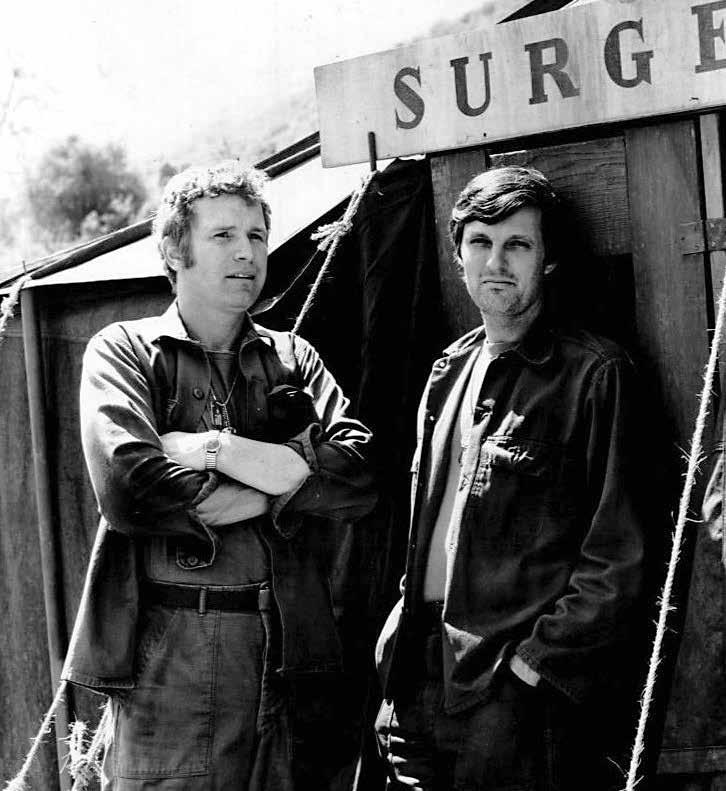
about Carol’s background or family except that she has a brother, Jack, and sister-in-law, Pauline, who are the parents of Cousin Oliver who has made an appearance or two on the sitcom.
It has never been made clear whether Carol Brady was a divorcee or widow. Creator and executive producer Sherwood Schwartz had intended to present Carol as a divorcee, but ABC refused to allow her status to be revealed on the show.
On the other hand, Major Charles Emerson Winchester III of M*A*S*H consistently made his homesickness for Boston known. Played by David Ogden Stiers, the name Charles Emerson Winchester was derived from three actual street names in Boston. Despite his blue blood upbringing, Charles was a perfect foil for Hawkeye (Alan Alda) and B. J. Hunnicutt (Mike Farrell).
The pompous Charles Winchester was born in his grandmother’s house in Beacon Hill. As a Winchester, he was a proud member off the wealthy Boston Brahmins, which included the Dudleys, Saltonstalls, Winslows and Lymans. The Brahmins are a very real collection of aristocrats that were descendants of English landowners. He graduated summa cum laude from Harvard and worked at Massachusetts General Hospital where he was on track to become Chief of Cardiothoracic Surgery prior to being drafted in the U.S. Army.
Winchester was far more intelligent and skilled than his predecessor Major Frank Burns (Larry Linville). Although he too was the
Among the famous TV fictional characters with Massachusetts backgrounds are Captain “Trapper” John McIntyre of “M*A*S*H,” played by Wayne Rogers, pictured with his sidekick Captain “Hawkeye” Pierce, played by Alan Alda. (Photo/ Wikimedia Commons)
chester returned to Boston where he became Chief of Thoracic Surgery at a prestigious hospital.
According to the book and film, Hawkeye’s sidekick Captain “Trapper” John Francis Xavier McIntyre was a Bostonian who graduated from Dartmouth College where he also played quarterback on the school’s football team. Unlike his slightly more strait-laced replacement, B.J. Hunnicutt, Trapper was the heavy drinking, womanizing class clown type who loved playing practical jokes on Major Frank Burns and Margaret “Hot Lips” Houlihan (Loretta Swit). Trapper’s nickname stemmed from an incident where he was caught in a compromising position with a woman in the lavatory aboard a Boston and Maine Railroad train. The woman claimed that, “He trapped me!”
butt of Hawkeye’s jokes and insults, Winchester often matched wits with Hawkeye. After the war ended and the 4077th was decommissioned, Win-
The married thoracic surgeon and father of daughters admits that his wife collects his pay for a special fund to pay private investigators who will spy on him the second he gets home from Korea.

By evAn WAlsh contriButing Writer
REGION – Mr. Handyman of Central MetroWest excels at building decks, but the company is just as passionate about building relationships with its customers.
As a locally owned and operated company, Mr. Handyman offers a wide range of services, including repair work, remodeling, painting, window services, door installation, floor installation, and carpentry. Over the last 20-plus years, Mr. Handyman has helped thousands of customers improve their homes.
The commitment to exceptional customer service begins from the moment you engage with the company. Whereas other contractors can be slippery — almost impossible to get a hold of, even in emergencies — Mr. Handyman has a robust and Massachusetts-based customer-service operation. When you call the company, you can expect a prompt response from a knowledgeable representative.







“We’re always available to answer the phone and promptly return calls. It’s definitely common for people to come to us and say, ‘I tried to reach out to my regular contractor and they didn’t answer.’ We understand the importance of reliability. People want to trust that someone
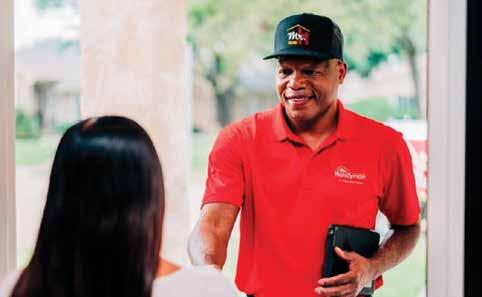


Mr. Handyman is dedicated to helping people “age in place.” Give the company a call to see how you can live more comfortably in your home.
said Campbell.
In the rare event of an issue, Mr. Handyman fully guarantees its work. If the result of a project falls short, the company will return to the property and address any concerns. Moreover, the company is licensed, bonded, and fully insured, eliminating risk for the customer.
While Mr. Handyman may not always offer the lowest prices, its attention to detail, customer service and quality craftsmanship ensure customer loyalty.
“It’s about the extra steps that we take,” said Campbell. “We prioritize our quality of work, punctuality, clear communication with customers, and transparent pricing. There are no hidden fees.”
will show up and actually do their job,” said Mr. Handyman of Central MetroWest Owner Michael Campbell.
Their responsiveness is just one aspect that has earned Mr. Handyman the Angi Super Service Award for eight consecutive years. Mr. Handyman employees are courteous and professional — they carry proper identification to promote trust, wear uniforms, and they’re happy to take the time to communicate effectively with customers and outline how the work is progressing.
“We’re very proud of our record… Our technicians can relate to our customers,” Campbell said.
Mr. Handyman employees care about their craft, and Mr. Handyman cares for its employees. In addition to generous benefits, the employees are supported on an emotional level.
“While some companies may overlook their employees’ well-being, we make it a point to check in with our team members daily. We ensure that they feel valued and supported,”
The company’s excellence is described in its motto: “On time, done right.”
Currently, Mr. Handyman is focusing on educating consumers about “aging in place,” as well as its safety and mobility services. These services prioritize installing senior-friendly accessories that can allow someone to stay independent in their home for longer. Named a “Home Safety Advisor” by Age Safe America, the company is “Aging In Place Certified” through the National Association of Home Builders.
“We’re guiding clients on ways to improve their comfort and prolong their ability to live in their homes. That’s a significant focus for us at the moment,” Campbell said.
Mr. Handyman of Central MetroWest services every town in the Fifty Plus Advocate coverage area. For more information on the company — or to contact a customer-service representative — call 508-366-3690 or visit https://www.mrhandyman. com/central-metrowest/.

By shAron oliver
contriButing Writer
WORCESTER – Back in the day, there was only one place to go in Worcester for your back-to-school clothes shopping — Maurice the Pants Man. Any teenager in the 1960s, ‘70s or ‘80s who heard the invitation to “Come on down!” over the radio knew it was like hearing a cattle call for getting great deals on a pair of sturdy dungarees. Located at Millbury and Lamartine streets, moms and dads appreciated the Maurice the Pants Man store as well since it went easy on their wallets.
Founded in 1923 by Maurice J. Ravelson and his son Arnold (Arnie), who took over the family business at age 22 after serving in the U.S. Navy and after Maurice was injured in a serious car accident, the store became somewhat of an area legend. The business started out as a simple Army and Navy supply store but then morphed into a one-stop shop destination for brand-name casual wear and five-pocket denim jeans sold at off-prices. Levi’s were an all-time favorite with Worcester area residents.
The store remained a shopping destination for generations of locals looking to purchase back-to-school clothes and holiday gifts. Arnie even became somewhat of a local celebrity for his radio ads, and, thanks to his business acumen, turned his father’s small store into a chain of several retail stores known as Maurice the Pants Man. He was often greeted by locals on his daily strolls through downtown Worcester on his way

Colony Retirement Home III is congregate housing for seniors. Enjoy nutritious “Home Cooked Meals,” served in our attractive dining room with your neighbors and friends.
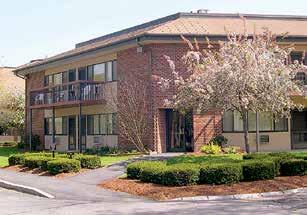
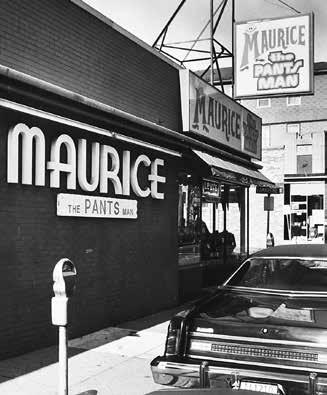
Maurice the Pants Man was an iconic clothes shopping destination for generations of Worcesterarea residents. (Photo/ Courtesy of Worcester Historical Museum)
to work at the Millbury Street store and was a mentor to hundreds of young adults who worked in his stores.
Fond recollections
Former young shoppers and employees fondly recall days spent at the merchandise store on Facebook. Nicholas Gervais wrote:
“Maurice The Pants Man...a staple of Worcester no doubt...great memories working the Sidewalk Sale in Worcester...t-shirts 3 for $10!”
Joe Daly recalled:
“Come on down, see Maurice, the Pants Man! We’re at 30 Millbury Street in Worcester. Take exit 13 off of I-290, and come on down!” 20 years later, I still remember that radio spot word for word!”
Shana Sissel added:
“Well, I’ll add my little story to the thread. I was fortunate/unfortunate to be the daughter of the ‘legendary’ Paul O. of the original Worcester location, so I grew up thinking I was actually related to the Ravelsons. My mom worked part-time at Maurice’s, and I basically grew up in the stock room. When I was 12 Uncle Arnie let me sort hangers in the stock room to earn money for Christmas presents. Once I was 14, I worked on the floor and my 11-year-old brother got the plum hanger sorting job. I loved the stock rooms; they were such a crazy maze under the store you never knew who’d surprise you down there. Ah, I miss that place, so many great memories growing up there!”
Rise and fall
At the time of Maurice Ravelson’s death in 1985, Maurice the Pants Man was one of the largest volume sellers of denim pants in Central Massachusetts with reported annual sales of $2 million. The senior Ravelson believed the key to his success was good old-fashioned service, low prices and overhead, and all-out advertising, according to the Worcester Historical Museum.
Maurice the Pants Man closed in 2016, unable to compete any longer with the cheaper alternatives that were available in the discount clothing market. During his retirement, Arnie and his wife Barbara enjoyed spending summers in Maine and winters in Florida. He died on October 17, 2024, at age 94 at the Jewish Health Care Center. Arnie is survived by Barbara, his wife of 68 years, three children, one sister, four grandchildren and a host of nieces and nephews.
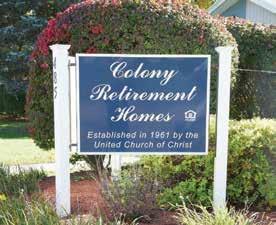
apartments at

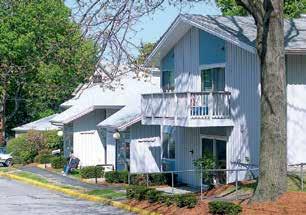
Call Monday thru Friday, 9am to 5 pm




By shAron oliver contriButing Writer
REGION – Although Michael Vale, aka Fred the Baker, passed away in 2005, he is still Dunkin’ Donuts’ most iconic advertising mascot. The 1980s commercials by the famous coffee and doughnuts chain founded in Quincy depicted his character as someone who represented millions of people who could relate to the daily grind and not to mention his famous catchphrase “Time to make the doughnuts” that is still quoted to this day.
Hundreds auditioned for role
Of the hundreds of actors who auditioned for the role of Fred the Baker, Vale was not the marketing team’s first choice to be a pitchman for the job. They wanted actor-comedian Lou Jacobi, but the moment Vale sluggishly walked into the bathroom wearing pajamas and said, “Time to make the doughnuts,” they knew he was the right person, according to an interview given to CNN by ad exec Rob
Berger in 2005. The catchphrase became so popular that Dunkin’ Donuts founder William Rosenberg used it for the title of his 2001 autobiography.
Younger generations who have heard someone say, “Time to make the doughnuts,” were often confused as to its meaning. But for those who grew up seeing the sleep-deprived Fred wake up, drag his feet across the floor before flashing a big smile as he begin to serve customers freshly baked batches of Dunkin’ Donuts know the meaning and how classic this commercial was. The catchphrase has indeed taken a life of its own.
Classically trained actor Vale, a native New Yorker, was a classically trained actor who studied at the Dramatic Workshop at The New School in New York City alongside classmates Rod Steiger, Ben Gazzara and Tony Curtis. He was a regular on Broadway and made his film debut in the 1957 drama “A Hatful of Rain,” playing a taxi driver. However, his most prominent role was as a jewelry salesman in the 1976 film “Marathon






Life is uncommonly


Heywood Wakefield Commons offers worry-free living at affordable rates in private apartments with services available such as:
• Daily social activities & programs
• Three chef-prepared meals daily
• Assistance with personal care needs
• Medication reminders
• Laundry & housekeeping services
• Safety checks


• Dedicated, caring staff 24/7 For more information or to schedule a tour, call Kristy Livingston at (978) 632-8292 or email info@hwcommons.com .








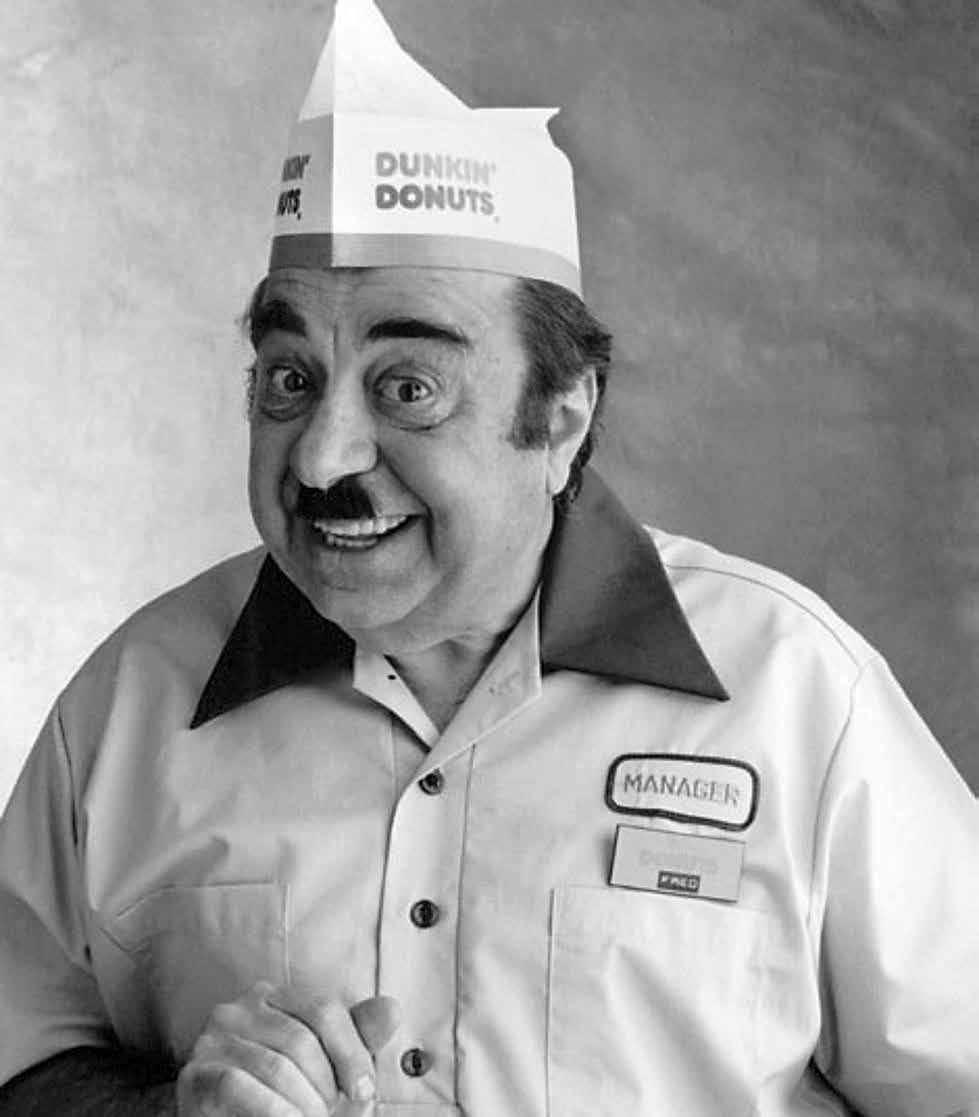
Fred the Baker, portrayed by actor Michael Vale for Dunkin’ Donuts TV commercials in the 1980s, became an iconic figure for the brand, with his catchphrase, “Time to make the doughnuts.”
Man,” starring Dustin Hoffman and Laurence Olivier.
Baby Boomers have likely seen Vale play bit parts in childhood series such as “3-2-1 Contact” (in recurring role of Soapy Suds), “Kojak,” and “Car 54, Where Are You?” Before the Dunkin’ Donuts commercials, Vale played Sam Breakstone in the Breakstone cottage cheese and sour cream commercials.
Michael Vale played the unforgettable role of Fred the Baker for 15 years, retiring in 1997. The role is indeed a memorable one, as many can recall.
TeranIcer commented on a Fred the Baker Dunkin’ Donuts commercial on YouTube:
“One of my Top 5 fav commercials. I remember watching this saying ‘you could’ve at least shaved the moustache.”
DanielFlores-qd8ly also wrote:
“They just don’t make commercials like this anymore!!! Love this commercial!”
Scott Gammans noted:
“The mother pointedly turning her daughter’s head at the start. The baker’s assistant dropping her cookies.”
Mmattingly6 added:
“When he moves his finger away from his mustache and the lady be-
By MAriAnne lyons Delorey, Ph.D.
Last spring, Colony Retirement Homes was in the news with a press release and photo op to collect an $8 million check from HUD from the Green and Resilient Retrofit Program (GRRP), which was a grant program initiated to address energy efficiency, climate change resilience, and air quality needs in one of our buildings. The intent of the program was to help us analyze our building and determine what projects made the most sense. The grant required that we share the cost of the identified projects so we would have ‘skin in the game.’

First, a news flash. The check was a prop. We did not actually get to the point of identifying a scope of work before the funding was cut this year by the federal government’s Department of Governmental Efficiency (DOGE). While we did get some information out of the analyses done, we did not receive a penny that we could invest in our building. DOGE has reported that its goal in cutting governmental spending is to reduce “waste, fraud, and abuse.” But I don’t think there is enough reporting about the real world impacts of reduced government funding, including those on our elders.
Breaking down our intentions for the grant into specific projects, let’s talk about what this really means. According to the GRRP webpage, the grant proposes to invest in, “innovative energy efficiency and greenhouse gas emissions reductions, green and healthy housing measures, renewable energy generation, use of building materials with lower embodied carbon, and climate resilience investments.”
For Colony, the projects we identified can largely be put into three categories:
• Improves efficiency and reduces emissions (such as a new solar array or better caulking for our windows)
• Improves safety (such as new electric panels)
• Improves quality of life for our older residents (such as energy star rated refrigerators and a modern heating system)
hind the counter drops her donuts… I LOL’d! I remember watching this growing up. My little sister and I always laughed SO hard.”
Retirement celebration included a parade
Market research conducted a survey to see how customers would react to Fred the Baker retiring. Results indicated that customers did not want to see him go but if he must go then he should be treated like an honored friend and employee. The company created a campaign and retirement celebration for Vale, including a parade in the city of Boston, a “free donut day” that served nearly six million people on September 22, 1997. Also, Larry Bird, Mary Lou Retton, Sugar Ray Leonard and Bob Dole appeared in a series of commercials offering Fred their thoughts on retirement.
Fred the Baker would join the pantheon of legendary advertising icons to include the Maytag Repairman, Colonel Sanders, Mister Whipple and Madge the Manicurist.
Michael Vale passed away on December 24, 2005, from complications with diabetes. He was 83.
Dunkin’ Donuts issued a statement in tribute to Vale, noting that Fred the Baker “became a beloved American icon that permeated our culture and touched millions with his sense of humor and humble nature.”
Everyone, I think, would agree that eliminating waste, fraud, and abuse in government spending is a worthy goal. But I would ask the following questions about our grant funding:
What is fraudulent about wanting our residents to be able to breathe better in their homes?
What is wasteful about investing in a solar array so our electricity bills are lower?
What is abusive about upgrading electrical panels to ensure safety?
To those of you who are unfamiliar with how HUD interacts with housing providers, here is a primer. First, many of us are nonprofit organizations. Those of us who work there do earn a paycheck, but we do not profit from extra work. In fact, quite the opposite — we were more than willing to take on extra work for no compensation because we do the right thing by our residents. We also do the right thing by the taxpayers by making sure we are always thinking about insurability, liability, and long term asset management. Why should the government help a nonprofit provider with extra funds? Because ultimately, we are saving the taxpayer money.
If we don’t need more money from HUD to address rising insurance costs, we won’t ask for it. Further, if our residents did not live with us, many would be in nursing homes at a much higher cost. And if the government did not occasionally come out with incentive programs such as this GRRP, we would not be able to front the costs for something like a solar array which would ultimately save the taxpayers money.
The government is made up of humans, and no human is perfect, so no government program is perfect. However, this was a well thought out grant. It required agencies such as ours to share the costs of certain upgrades so we had “skin in the game.” It was also data driven and the intent was to investigate the building’s needs before determining the final scope of work.
All told, I think cancelling this contract was a mistake. I think labeling grants like this as “waste, fraud, and abuse” is blatantly misleading if not completely untrue. Our nonprofit gets the funds needed to keep the building open, but we do not get to line our pockets with this grant. We could have saved significant funds in energy and insurance costs — savings that HUD could have asked us to return. Now, it seems the taxpayers are the ones who will suffer at the hands of those who cancelled the contracts.
Marianne Delorey, Ph.D., is the executive director of Colony Retirement Homes. She can be reached at 508-755-0444 or mdelorey@colonyretirement.com and www. colonyretirementhomes.com.
By JAnice linDsAy contriButing Writer
April is my birth month. This year, thanks to Texas, I’m remembering the day I turned nine.
On my ninth birthday I was miserably, horribly, terribly sick with measles. (West Texas has been experiencing a serious measles outbreak, reminding me.) I recall that day so clearly because as I lay in bed in torment, my birthday party was happening without me, in the parlor next to my darkened bedroom.
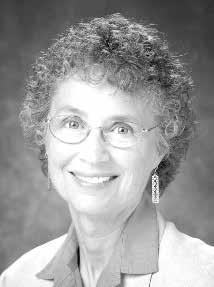
Our mother’s birthday was three days before mine. She had planned a family party to celebrate both birthdays, with her parents and our aunts and uncles.
I imagine that, when I took sick, she had already bought the party food and begun the cooking. She decided to celebrate without me.
The grown-up guests would be safe from contagion because they had suffered the disease as children.
We lived in a four-room house: a parlor/dining room; kitchen; my parents’ bedroom; and the bedroom I shared with my sister, who is less than two years younger than me. The door near the foot of my
bed opened into the kitchen. The door near Cheryl’s bed opened into the parlor.
To enhance my self-pity, Cheryl was not sick. Yet. She was enjoying the party along with everyone else. They were eating my tuna sandwiches. My chocolate cake. My ice cream.
I had no desire to eat. My body burned with fever, my aching muscles were too exhausted to move, my throat was sore, my head throbbed, and I lay in total darkness because any light hurt my eyes.
Occasionally Mom came to check on me. I appreciated the thought, but I almost wished she wouldn’t. There was nothing she could do for me, and when she opened the door from the lighted parlor, my eyes burned.
That day was the low point of my suffering. As I began my slow recovery, it was Cheryl’s turn. She had all the symptoms, but, in addition, she was delirious, for almost three days. She would cry out for Mom but not recognize her when she came. In the middle of one night, she got up and walked out the front door. She was going to school. I didn’t hear her, but fortunately the grown-ups did and they retrieved her as she walked down our front path in her nightgown. After that, they locked all the doors.
Cheryl recently told me, “I can so well remember slipping off into delirium. It felt like I was on a train that was going faster and faster. I knew exactly what was happening but I could not do anything about it.”
When Cheryl finally returned to us, I was sick enough to still be in bed. I watched Mom try to tempt her to eat something. Chicken noodle soup? No. An orange? (Our grandmother had oranges shipped to her from Florida; we loved them.) No. Ice cream? No.
Finally, Cheryl said, “If I had some spinach and cabbage, I would eat it.”
I thought, “Spinach and cabbage? She’s still delirious!” But Mom cooked her a big bowl of spinach and cabbage and she ate every bit.
Our recovery was slow but, fortunately, complete.
Lest you think our parents were lax in not having us vaccinated: the measles vaccine did not yet exist. I was so grateful when it came out, in 1963. Our children would not have to suffer as we did.
In our world’s not-so-distant past, children commonly died of diseases they no longer even contract. We can thank vaccines for that.
Contact jlindsay@tidewater.net


By sAnDi BArrett contriButing Writer
REGION – Practiced equestrians and novices alike can enjoy cantering through local woodland trails and wildflower fields astride a beautiful horse. Several stables across the Commonwealth offer riding lessons, trail rides, and equestrian training for competition. Allow yourself the pleasure of simply experiencing the pure joy of riding a horse.
Plan unique family outings, cool birthday parties, or engage in a private lesson. Consider giving horseback riding a try. Many ranches and stables in Massachusetts are open year round.
Horseback riding, according to Healthline.com, offers excellent fitness training. “Strength, balance, coordination, flexibility, mental toughness, endurance, cardiovascular fitness, a clear mind, and trust” are all touched upon with just one ride.
The core strength required to stay balanced on your ride is key to fitness improvement. Balance and cardiovascular strength can be increased by riding. Mental health can improve with the connection made with your horse, getting outdoors, and participating in an activity you love.
All the way around, horseback riding is a wonderful exercise option. Here’s a few options in central Massachusetts.
A one-of-a-kind, sprawling property in picturesque Princeton is Cornerstone Ranch. Its riding trails run through peaceful forested landscapes. The ranch offers a perfect spot to be one with your riding companion where you can focus on the ride, the scenery, and your thoughts.
Cornerstone Ranch offers private and group horse riding tours to suit your adventure needs. If you don’t want to ride, they also offer horsedrawn sleigh and wagon rides. Imagine your next family gathering, girls adventure, or grandkids sleepover beginning with a special horse encounter. This unique outing is a fun way to bond with loved ones and create lasting memories.
Private or group lessons with patient and caring instructors are the hallmark of this highly rated ranch. When you pair a rider with the right horse and teacher, it is nothing short of magic.
Plan a talk-of-the-town children’s birthday party at this scenic

venue. The kiddos will love horseback riding, pony rides, or a group wagon ride. The ranch provides a campfire complete with hot chocolate and marshmallows to round out the birthday fun.
Ridge Valley Stables Grafton
Family friendly guided riding can be found year round at Ridge Valley Stables. Their trail guides will take you on a local riding adventure. Alternatively, you can join them for a ride along the beach on Cape Cod where the gentle waves lap at hooves along the shoreline.
When you are planning your next kids’ birthday party or family reunion, they will bring a pony (or two) to your gathering. It is a wonderful way to expose your little loved ones to these wonderful animals. It could be the start of a lifelong love match with riding.
Heron’s Crest Stables West Boylston
For the rider who is interested in equestrian competitions, Heron’s Crest Stables is a great choice for students of ages.
Beginners and practiced equestrians can take horse riding lessons focusing on equitation (dressage and more) and show jumping (navigating
course obstacles).
Heron’s Crest Stables is also a wonderful spot to board your treasured four-legged companion. They take great pride in caring for your horses.
Future equestrians will love taking lessons at Pine Fall Farm. Novice riders and competition ready students will find a team of wonderful instructors ready to impart their technique focused training.
Several horse boarding options are available — full care, pasture, and rough board — to meet your equine housing needs.
Whether you are a beginner or experienced rider, there are fun spots across Massachusetts where you can canter through picturesque scenery year round. You can plan a fun gathering or embark on an equestrian competition path; your horseback riding options abound.
If riding lessons are on your 2025 “to-do list,” you should consider joining experienced wranglers for a ride in the woods astride a beautiful horse.

By shAron oliver contriButing Writer
BEVERLY – The off-price retail chain Marshalls is well known for offering apparel and homewares at low prices. But founder Alfred Marshall’s initial focus was on entirely different items for sale. Born in Lawrence into a wealthy family in 1919, Marshall witnessed his father abandoning the family after losing his fortune during the Great Depression.
Expansion of original supermarket
His love for buying and selling stemmed from living with an aunt who ran a variety store. Marshall began his career after World War II by working as a welder and contractor. He eventually opened a fruit and ice cream stand with money borrowed from his aunt to purchase land in Beverly where he sold banana splits for 29 cents on Sundays to avoid tossing out old, ripened bananas. By the 1950s, Marshall was selling wholesale products out of his expanding super-
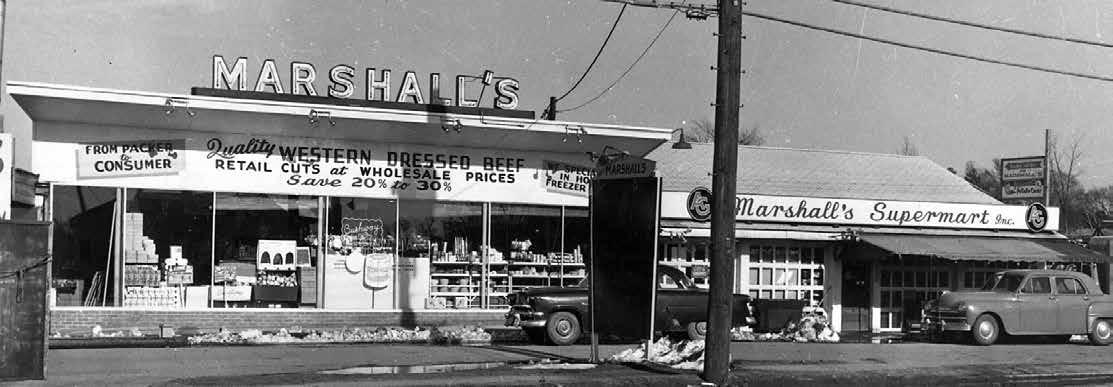
market, including cosmetics, baby supplies and sundries. This location became the first Marshall’s (before dropping the apostrophe) department store.
Contemplating increased spending habits due to growth in the suburbs, Marshall and his associates came
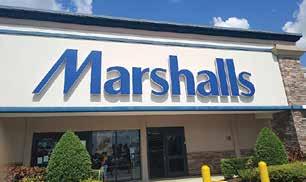
Regaining


For those recovering from a stroke, injury or illness, regaining your best quality of life begins with your ability to choose. Choose us for exceptional results.
up with more ideas. He had a concept of giving consumers brand names at prices they could afford so he sold deeply discounted merchandise from boutiques and coupons for 5-cent ice cream sandwiches made by his children. The original store also had a soda fountain and grill, which was a sublet of floor space, the “A & M Luncheonette” (for Alice & Mickey Masters, the proprietors).
Several people fondly recalled some of Marshalls’ early days on Facebook.
John Baxter wrote:
“I worked for Al Marshall for many years growing up, at the auctions down under department store and in the grocery store. He was a great guy.”
Janet Lessard shared:
“I worked at that snack bar in late 60s!”
Joe N. Lorraine DiVincenzo added:
“Early on, in the storage area behind one of his Beverly stores, he’d hold an auction type evening where folks would bid on simple items and once someone bid on the winning amount he’d sell the item at the price bid to anyone who wanted to buy it! He continued grow from there.”
Todd Kerr confessed:
“I did not know that they were a supermarket at one time.”
Children of founder worked hard
The Marshall family lived near their first store where the children would work after school. According to the oldest son, Ronald, he and his siblings would help by sweeping the floors and stocking shelves. He added
that his father would buy bricks of ice cream that they would have to cut into pieces for sandwiches. Although they were not paid for the job, the siblings were allowed to eat as much ice cream as they wanted. After having their fill, they didn’t want to eat ice cream for a month.
During the holiday season, the Marshall children would cut sheets of wrapping paper from bulk rolls for packages filled with mixed assortments. On Christmas Day, their father allowed them to pick three or four toys from the store shelves. One year after his kids discovered the best toys had already been sold, they came up with a plan to hide their favorites in the stockroom. Ronald Marshall felt their father knew of the scheme but never scolded them for it.
Marshalls had 36 locations throughout New England and California by 1976, which were directly owned by Marshall and three other business partners. By April 1987, there were 261 stores across the country. In 1995, Marshalls was purchased by TJX, the parent company of its main rival, TJ Maxx. There were 496 stores at the time. By 2021, there were 1,131 Marshall stores worldwide. Not bad for a store that started out as a supermarket.
Alfred Marshall died in 2013 at the age of 94.
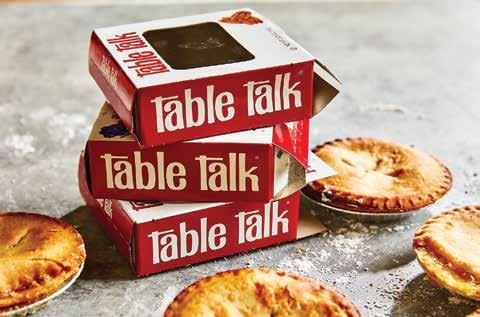
By MichAel PernA Jr contriButing Writer
WORCESTER – A century later, people are still talking about the little pies made in Worcester. The Table Talk Pie Company was founded in 1924 by two immigrants from Greece, Angelo Cotsidas and Theodore Tonna. Like many others, they came to the United States in search of a better life for themselves and their families.
The pair met while working at a bread-making bakery owned by another Greek immigrant. Soon, they decided to open their own bakery. They started out making bread but also made pies. According to the company’s website, the pies would be made by hand, baked overnight, then sold from horsedrawn wagons. The wagons travelled throughout the area, advertising the pies with the cry, “Fresh pies! Get your fresh pies here!”
There are two versions of how the name “Table Talk Pies” came about. The first is that the duo wanted to relate that they considered it important for a family to sit and talk around the kitchen table while enjoying a delicious slice of pie; The second story is based on information from the Tonna family — is that the name stems from Theodore Tonna’s initials: T. T.
The company grew steadily over the years. As business increased, so did the need for larger quarters. Initially, the business was located on Clayton Street in Worcester, then moved to Beacon Street. By 1942, it moved again, this time to the corner of Green and Washington Streets.
The popularity of Table Talk pies
continued to grow. Eventually, two sizes were produced — a four-inch snack pie and a larger eight-inch version. A variety of flavors ensure that almost any preference could be accommodated: chocolate crème, peach, pumpkin, cherry, pecan, chocolate éclair, pineapple, lemon, banana crème, apple, and blueberry.
The success of the company was not without some rough times. It was sold to the Beech-Nut Company in 1965, then changed owners a number of times before filing for bankruptcy. In 1985, Christo Cocaine (Theodore Tonna’s son-in-law), who had previously worked for the company, bought Table Talk out of bankruptcy and re-opened the business at the Green/Washington Street location in Worcester.
Under Cocaine’s leadership, the business thrived once again. A new pie-making facility was opened in Shrewsbury in 2015, followed by a 50,000 square foot facility in South Worcester. More recently, a state-ofthe-art production facility was constructed at 58 Gardner Street, again in South Worcester.
The company has flourished. Table Talk pies are now sold in all 50 states, Canada, Mexico, Puerto Rico and other places. The snack size is the best-seller—in 2019 the company sold 240 million of its four-inch pies, along with 25 million of the eight-inch, nine-inch, and ten-inch varieties. The pies are also supplied (under a private label) to WalMart stores throughout the country. Locally, the pies are carried by Market Basket stores and a wide variety of oth-
er markets and stores, including BJ’s, Shaw’s, Stop & Shop and Star Market.
A small Table Talk pie store was located for many years at 152 Green Street in Worcester, but it closed this January. The prices for the Table Talk pies make them extremely affordable and are a stark contrast to the high prices charged by many local stores and bakeries. The
four-inch snack pies sell for 75 cents each with the larger eight-inch pies selling for $4 ($5 for a pecan pie).
What started out as a two-person operation selling hand-made pies from horse-drawn wagons has grown to a company where more than 300 people are employed full-time producing this Worcester-born treat.
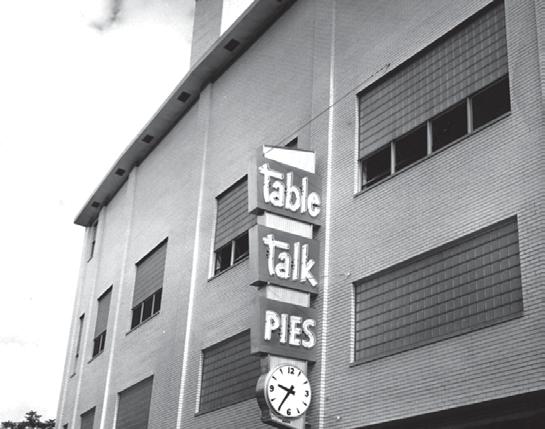
Talk Pies was founded in Worcester in 1924, had a large factory on Green Street, shown here, and still maintains production facilities within the city.
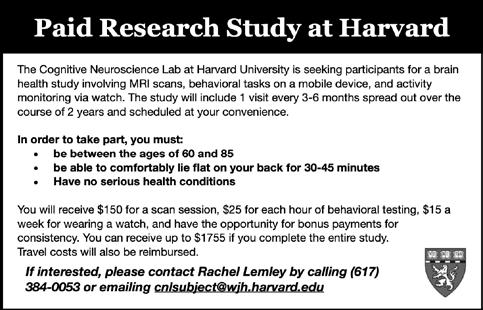

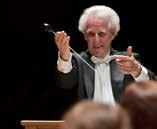

By shAron oliver contriButing Writer
SPRINGFIELD – Stores have been stocking shelves with shampoo brands since the products became available and some of the ads are unforgettable. Perhaps none more than Breck shampoo and those perfectly coiffed Breck Girls. Breck shampoo was founded in Springfield in 1930 by Dr. John H. Breck, Sr. and was credited with introducing the first Ph-balanced shampoo.
Over the years, there have been only two artists who worked as official illustrators of Breck Girls — Charles G. Sheldon of Worcester and Ralph W. Willliams of Canton. Initially, distribution remained localized in New England, and the product appeared only in trade publications and was sold exclusively to beauty salons until 1946.
Over a hundred Breck Girls
There have been well over a hundred Breck Girls. The very first one was a 17-year-old spirited blond with a cherubic face named Roma Whitney Armstrong of Springfield and her portrait became the company trademark. Sheldon created his first pastel portraits for Breck in 1936, launching what would become one of America’s longest running ad campaigns. In 1946, the Breck campaign featured Sheldon’s 1937 painting of Whitney.
Ralph Williams succeeded Sheldon after his death and continued the company’s tradition of illustrating the models as sweet, wholesome and elegant, thus setting a standard for freshly shampooed females. Breck Girls symbolized “the kind of girl a mother would like her daughter to be,” featured in a gold frame with the words “Breck — Beautiful Hair” as the only words in the ad. Breck also was a sponsor of the America’s Junior Miss Pageant.
Not long after Williams came onboard, he created a portrait of his three-year-old granddaugh-
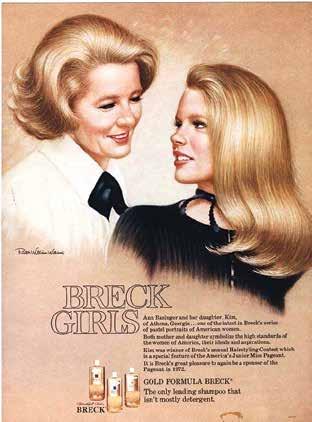
ter Faith Ann Williams of Burlington. The young dark-haired tyke was featured in the company’s Christmas ad and appeared in several magazines.
Most Breck Girls were selected by the artists after spotting them on the street, in offices, church and summer camps. The first Breck girls were members of the Breck family, employees of the company and friends.
“We have never used professional models,” said Edward J. Breck, chairman of the board and son of
ASSISTED LIVING FACILITIES
Bigelow Village – Rutland
LIVING
Congregational Retirement –Melrose
Brookhaven Assisted Care – West Brookfield
Heywood Wakefield Commons – Gardner
SUBSIDIZED HOUSING
Colony Retirement – Worcester
Green Hill Towers – Worcester Sherwood Village – Natick
phone
that you have marked.
John Breck. The ads were normally on the back cover of such magazines as Family Circle, Glamour, Ladies Home Journal, Woman’s Home Companion, Seventeen, and Vogue.
In 1971, Hasbro even manufactured the Bonnie Breck doll which was used for Breck shampoo advertising and costing only $2. The vintage collectible is still available for purchase online through sites like Etsy.
Breck ads and commercials captivated the public and female consumer market. The portraits represented ideals of beauty at the time and reflected art and culture. So much so that the Breck Girls collections is part of the 20th-century advertising history records for the Archives Center of the Smithsonian’s National Museum of American History.
There eventually came a time when the glossy manes seen in Breck ads did not belong to women noticed as they went about their ordinary lives. Celebrities like Cheryl Tiegs, Cybill Shepherd, Jaclyn Smith, Farah Fawcett, Christie Brinkley, Brooke Shields and Kim Basinger along with her mother Ann were also chosen, thanks in large part to Williams, who often used professional women.
As with many products manufactured decades ago, competition and an absence of brand loyalty among consumers through the 1970s and 1980s helped wash Breck’s popularity away. The Breck Girl campaign was discontinued around 1978, although there have been at least two small revivals, first in 1992 with the Breck Girls Hall of Fame, and again in 1995 with the search to find three new Breck Women.
Nevertheless, Breck Girls’ legacy remains a part of America nostalgia from the golden era of advertising.

By shAron oliver contriButing Writer
BOSTON – Only the incomparable Bette Arnold could have forced the question, are you talking about her car or her restaurant? She, along with her signature vehicle (a yellow Rolls Royce) and restaurant/nightclub, Bette’s Rolls Royce, were often the topic of conversations during the 1970s and distinguishing one from the other caused confusion at times.
Fond memories from patrons
Located on Union Street near Faneuil Hall, Bette’s Rolls Royce served $1.25 cocktails for two in 1974 and chopped sirloin or soused shrimp for supper while, on occasion, Arnold serenaded her customers. The food, music and atmosphere ensured a steady stream of loyal regulars.
Lucy Giorgio-Pirker recalled on Facebook:
“The best place for cocktails and peanut shells on the floor. Spent a few New Years’ celebrations here — the bomb! Oh, to be young! Ha, if walls could talk!!! Teehee… remember the Royce and the tickets!!!”
Martin Broderick added:
“Great lady. Had a great piano player named ‘Charley.’”
Before opening her restaurant in 1971, the effervescent Arnold sang with the Chappie Arnold Orchestra, a big band ensemble formed by her first husband. It was during this time she first discovered her gift for management after lining up gigs for the band.
Entrepreneurial aspirations
As a graduate from Simmons
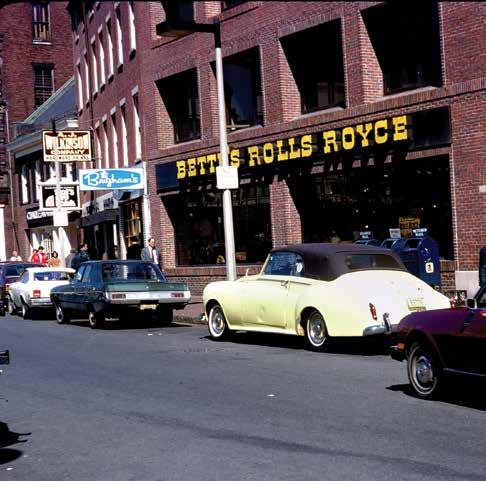
College with a degree in psychology, Arnold longed to help other women with entrepreneurial aspirations. She and her husband Chappie founded a bus company after realizing many kids did not have transportation to school and invested in real estate before turning their sights to opening an establishment offering the “best fun, best food, and best booze in town.”
The Brighton native also hosted dinners at the State House and



coordinated Christmas dinners for disabled children. The Arnolds eventually divorced but remained friends even when she remarried in 1975, until Chappie’s death in 1988.
That was the restaurant and nightclub but then there was the matter of Bette Arnold’s legendary automobile — a 1963 canary yellow Rolls Royce that was constantly illegally parked outside her restaurant. Every day, she would illegally park her car in front of the restaurant and every
day the police gave her at least four parking tickets. In those days, however, police did not keep a strict record of parking tickets. Plus, college students had a habit of pulling tickets off cars, especially those with out of state tags so that visitors wouldn’t know they got them.
The toast of Boston claimed her luxury car drew people from around the world looking for a good time in the city and that keeping it parked outside the restaurant was responsible for the majority of her walk-in clientele. The city disagreed and one judge even ordered Arnold to pay her fines via certified checks instead of her favored personal checks which sported an image of the car. One year, Arnold even requested a jury trial to fight her tickets and brushes with the law. Many may also recall seeing Arnold perched on her Rolls Royce clad only in a green body stocking during Boston’s St. Patrick’s Day parades.
Arnold sold her restaurant in 1980. Bette Jeanne Arnold Charles died at the age of 90 in 2011. Her daughter Judith A. Cowin, a retired justice of the supreme judicial court, admitted modesty was not her mother’s strong suit. Cowin added that her mom was flamboyant and did not care about the rules but had a huge heart and praised her for being a super mother, grandmother and great-grandmother. Arnold had another daughter named Joyce (Jackie) who died in an automobile accident in 1970.
The woman who loved life and people once said in The Boston Globe, “I have had a great time. I’m up 20 hours a day. Who needs sleep? Sleep you’ll get plenty of in eternity.”
